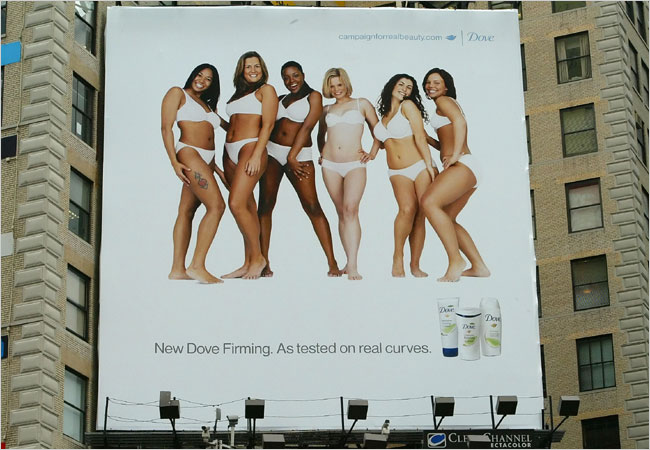Dove’s campaign calls women to action: choose beauty. Do it, just do it! Their campaign seems to claim that if you choose their products, boom: you’ve gone and chosen beauty. Images of women all over Dove’s Tumblr depicts them choosing between doors labelled “average” or “beautiful”. The firming lotion in the billboard below becomes a confidence-in-a-bottle product, rather than just another drugstore product. The general idea behind the Real Beauty campaign may well be a good one, but tying it together with a company and their brand in this way leads less to women feeling good about themselves in general, and more to them feeling good about that last purchase they made. This billboard shows how Dove is drawing the female gaze rather than the male, and then using that to sell happiness.
In his work, Écrits: A Selection, Jacques Lacan redefines the classic Descartes quote from “I think therefore I am,” to “I think where I am not, therefore I am where I do not think.” Essentially, he argues that our definition of who we are is formed outside of ourselves. In this case, Dove is attempting to influence how we view ourselves with their body-positive messages. Ideally, their influence would be a positive one, and I will explain how that would come about.
 Above is an image of one of Dove’s billboards, showing a handful of racially diverse “average” women with their happiest smiles residing above text advertising Dove’s new firming lotion. The women wear white, likely cotton, undergarments with no frills or extra details common of some advertisements. Mulvey’s concept of the gaze is that of a male gaze where, “In a world ordered by sexual imbalance, pleasure in looking has been split between active/male and passive/female. The determining male gaze projects its phantasy on to the female form which is styled accordingly” (Visual Pleasure and Narrative Cinema). This billboard defies this concept. While stripped down to bare minimum in regards to clothing, the women are not dressed or posed for the male eye: simple, white clothes, bright lighting, and mildly relatable figures (i.e. none appear to be a size 0). The number of women also allow for ideas of solidarity and inclusiveness. In this way, the billboard is aimed to draw the gaze of women rather than men, reflecting more of a female fantasy for happiness, health, and boldness, rather than a sense of coyness or intimacy.
Above is an image of one of Dove’s billboards, showing a handful of racially diverse “average” women with their happiest smiles residing above text advertising Dove’s new firming lotion. The women wear white, likely cotton, undergarments with no frills or extra details common of some advertisements. Mulvey’s concept of the gaze is that of a male gaze where, “In a world ordered by sexual imbalance, pleasure in looking has been split between active/male and passive/female. The determining male gaze projects its phantasy on to the female form which is styled accordingly” (Visual Pleasure and Narrative Cinema). This billboard defies this concept. While stripped down to bare minimum in regards to clothing, the women are not dressed or posed for the male eye: simple, white clothes, bright lighting, and mildly relatable figures (i.e. none appear to be a size 0). The number of women also allow for ideas of solidarity and inclusiveness. In this way, the billboard is aimed to draw the gaze of women rather than men, reflecting more of a female fantasy for happiness, health, and boldness, rather than a sense of coyness or intimacy.
Mulvey also discusses the functions of this pleasurable gaze, on of these functions being “…identification of the ego with the object on the screen through the spectator’s fascination with and recognition of his like.” This function is noted as being narcissistic, and yet shows how we enjoy relating to those that we watch. Dove’s use of “average” women looking happy leads to the hope that someone will be able to identify with one of these women: if this woman is so happy after using Dove’s firming lotion, I will be happy, too! The product itself matters less and less: a firming lotion has one obvious purpose and message, but in this context that lotion isn’t intended to firm skin but to bottle self-confidence. It could also have a more nefarious message: without this lotion, you won’t be happy, healthy, and confident.
Dove’s original Real Beauty Sketches showed women how others viewed them less harshly than they viewed themselves. That is a great message, but it comes into play here in that women are taught to value outside opinions more than their own. That product and this stranger know better than women in general with regards to achieving their own individual happiness (Mother knows best!). The call to action seems to desire more agency for women over their own mind, yet their marketing campaign strips it from them.


Love the links you put in for comic effect – they are not only entertaining but illuminate what you want to say, You use Lacan and Mulvey well. I’d be more convinced that Dove ads attract the female gaze outside of a phallocentric paradigm if half the women weren’t collapsing in on themselves. More power poses! Like Wonder Woman! In all seriousness though, you make a strong argument here. Well done!
LikeLike
Reblogged this on The Expendable Citizen and commented:
An insightful “both/and” reading of Dove’s ad campaign.
LikeLike
I think it’s interesting how Dove’s ad campaigns aren’t really about their products, but about identities. Like you said, as a marketing strategy, “bottles of self-confidence” sell a lot better than lotion. I’m sure this extends beyond Dove to all other ads, like the Macbook vs. PC ads we talked about in class!
LikeLike